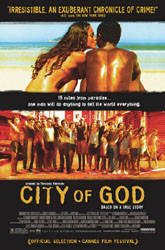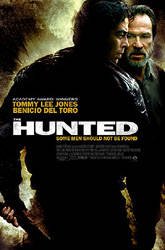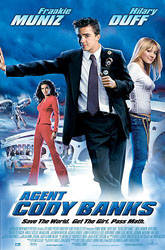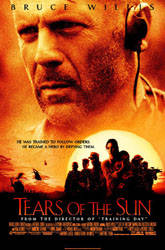 Director: Starring: Release: 17 Jan. 03
|
City of God BY: DAVID PERRY The Cidade de Deus (Portuguese for City of God) was built in the 1960s outside Rio de Janeiro as a way to keep the lower classes away from the beautiful beaches accessible for city dwellers. The people who lived in the Cidade were usually black, lower-class Brazilians who had no real relationship to the government that was trying to domesticate them. Instead, they found the easiest form of governing in gang violence. Today, Cidade de Deus is a cancer barely outside Rio, with slum tenements, drugs trafficking, and rampant homicide. Fernando Meirelles' City of God tries to create some historical perspective when considering the current state of the Cidade. The film carefully documents the rise to power within the gangs of the Cidade and the escalation of violence between warring factions beginning as early as 1967. Meirelles and co-director Kátia Lund (who served more as a consultant on life in the Cidade than as a director) continue their tale until the early 1980s, though reports from the current government (which called City of God a representation of everything in Brazil that needs to be fixed) is that not much has changed in the two decades since. The 1960s to 1980s were far more different, though, with the rise of the aforementioned gang leaders and their grasp on the drug trade within the growing population of the Cidade. At first, the crimes are by the hands of three smalltime thieves called the Tender Trio. They take a Robin Hood perspective to their job, hijacking a gas truck, giving money to the poor local kids and provoking the residents to steal the gas cans in the back of the truck. For the people of the Cidade circa 1967, the existence of a gang means a form of social welfare. The downfall of the Tender Trio comes when they try something larger. While their armed robbery of a bordello is criminal enough, it is the kid who gave them the idea that is truly disturbing to the already corrupt status quo. Li'l Dice (Silva) is probably no more than 12-years-old, but his plan is something that even his three twenty- something accomplices would never have imagined. What's more frightening, though, is that his interest is not simply in the robbery of all these victims, but also in their murder. Li'l Dice grow up to be Li'l Zé (da Hora), and collects all the power that the Tender Trio once had. However, his place is not as the benevolent keeper for the underclass his precursors had once been. Instead, he watches over his drug-infested empire with sadistic rage. He is near having the entire market for himself, and his war (both personal and social) is just beginning. Even if he controlled the entire Cidade, one gets the impression that this would never be enough for him. There's always more power to be collected, and more victims to torment. Li'l Zé is a character of Shakespearean levels. He is as much a Richard III as the tragic Romeo he wants to be. Li'l Zé is treated as ugly and unappealing (though his lack of attraction comes more from his actions than his looks), which only heightens his distaste for humanity. His best friend Benny serves as a pacifier to Li'l Zé's belligerent rage, though they were both part of the early turbulent years of the post-Trio Cidade. Benny begins as a Buckingham figure before finding his place in the more peaceful, fun-loving hippie lifestyle. When his conciliatory voice is gone from Li'l Zé's ear, his friend's hostility is free to destroy anything in its path. Without his Mercutio, this Romeo is more likely to kill Juliet by association than to console her. It is certainly intentional that Benny's move from the violence of the Cidade streets comes in cooperation with his move from the black lifestyle of his cohorts. Turned on to designer clothes, popular music, and a beautiful young girl named Angelica (Braga) by a white kid, Benny could be seen as an affront to the dominant black culture of the Cidade. He has embraced the Anglo materialism that is meanwhile permeating throughout Rio. But the Cidade, as long as it is under the control of Li'l Zé, cannot be anglicized. This is not a vacationer's resort, but a dirty, ugly world to live in. Without the watchful eye of a despotic guardian, the fear is that the Cidade can be cleaned up and, thus, leave the grasp of Li'l Zé. And so Li'l Zé begins searching for the imbalance needed to ensure his glory in his own world. But his search for both love (through rape) and domination (through murder) only incites the inner rage of an otherwise peaceful bus ticket taker named Knockout Ned (Jorge). The only drug dealer left besides Li'l Zé sees this as an opportunity to get support from someone in the event of an attack by Li'l Zé's posse (evidently consisting of kids age 12 to 21, all toting guns). And so, in the name of survival and retaliation, they begin a war in the streets of the Cidade that drafts every young boy in the slums as their lackeys. Outside of a small coalition of kids who have no interest in the power war beside them, only in the enjoyment of their own malicious games, the entire city seems to be divided between Li'l Zé's gang and Knockout Ned's gang. All of this is seen through the eyes of Rocket (Rodrigues), the younger brother of one of the Tender Trio members. He wants to be a photojournalist, finding friendship in Benny, Angelica (who he had long pined over), and even Knockout Ned. But he tries to remain neutral as best he can -- he sees it as the only way to survive. Working his way from the bottom, Rocket finds support at a major Rio newspaper by being the only person willing to go in and take pictures of the gang war. Having lived there -- much like Lund -- his only attraction to the rest of the staff is that he's willing to go to the place where they'd assuredly die. Unknowingly, he, like Benny, has walked into the white world that the Cidade is so violently repelling. Most of the comparisons City of God has received has been along the lines of "GoodFellas meets Pulp Fiction," trying to insinuate the gangland epic side of the story with Meirelles' kinetic photographic style. To a point, this comparison is misleading: Rocket, the film's protagonist, never wants to be a gangster like Henry Hill did, nor does Meirelles' push any real narrative conventions like Tarantino did. There is ingenuity to his approach, which is highly reminiscent of the barebones style of Robert Rodriguez in El Mariachi with the budget of a typical David Fincher film. I think of City of God as companion to Alejandro González Ińárritu's
Amores Perros and Alfonso Cuarón's Y Tu Mamá También that mixes the
former's violence with the latter's vivacity. All three attempt to work some form of
social commentary into a story that conforms to certain genre conventions, but do so by
appealing to audiences through an upfront style that deviates from conventions of
production and storytelling. By the end of the City of God, as Meirelles attempts
to finalize the story of Rocket while reminding the audience of the continuation of the
Cidade's violent soul, one almost expects Cuarón's cold, harsh narrator to add
perspective to the scene. The magnitude of City of God comes in the fact that one
is not needed. |
|
| ©2003, David Perry, Cinema-Scene.com, 14 March 2003 | ||






